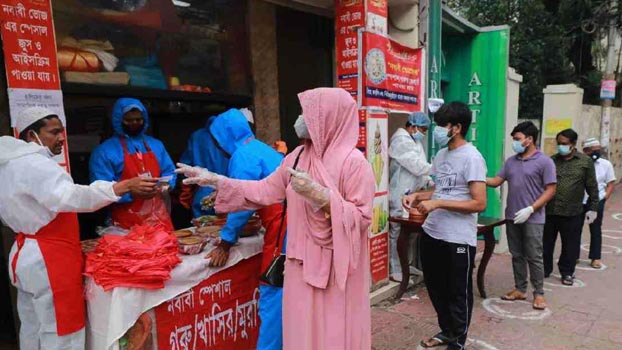Takeaway iftar items not safe: Experts

Though restaurants have been allowed to sell iftar items during Ramadan amid the Covid-19 pandemic, health experts advised people to depend on homemade food as the items from the eateries can be the means of coronavirus travelling, reports UNB.
They think the deadly coronavirus can spread everywhere -- from making to delivery-- of the iftar items at the restaurants if proper safety measures and health hygiene are not maintained at this time of dangerous pandemic.
Dhaka Metropolitan Police (DMP) allowed shops and restaurants to sell iftar items from Tuesday last on conditions that vendors and consumers would follow hygiene and a safe distance.
During a visit to some restaurants in the city on Thursday, it was seen many of those making and delivering the iftar items were not properly using gloves and masks while they were touching the food repeatedly with hands posing a risk of the virus transmission.
Customers were also seen buying iftar items from the eateries flouting guidelines on social distancing, and touching the food with bare hands. However, some were seen abiding by the directives while others did not pay heed to it.
Talking to UNB, Prof Meerjady Sabrina Flora, director of the Institute of Epidemiology, Disease Control and Research (IEDCR), said people need to stay at home as much as possible during the Ramadan as the asymptomatic Covid-19 patients are growing now. “Those observe fasting should maintain health hygiene and take normal and digestive food. They should also take homemade iftar on safety ground.”
Principal of Dhaka Medical College Prof Khan Abul Kalam Azad said taking iftar items from restaurants is not safe now. “Most restaurants in our country keep their iftar items open while their staff and customers touch those unsafely and this is how the virus can be spread.”
“People can buy iftar items from the eateries where all staff strictly follow health hygiene and use safety gears and keep their food in packets. But such restaurants are very rare in the city. So, we think no one should now take restaurant food,” he said.
Even though, Khan said, anyone buys any food from the hotel, it should not be eaten without rewarming it at home.
Besides, he said, people should wash hands with soap after unpacking the food and dispose of the packets in an appropriate trash bin.
The DMCH principal said restaurant authorities should remain careful about their staff so that no-one infected with the virus or having symptoms of it can involve in any process of food making and delivery.
Prof Dr Mohammed Atiqur Rahman, treasurer of Bangabandhu Sheikh Mujib Medical University (BSMMU) and a medicine specialist, said everyone should now take homemade iftar items under the current circumstances.
“One of my colleagues told me that he saw neither the hotel staff nor the customers maintain social distancing and use masks and gloves. It’s very risky now since the capital is still the hotspot for the transmission of the virus.”
Prof Dr Harun-or-Rashid, head of medicine department at Dhaka Community Medical College & Hospital (DCMCH), said the government’s decision to allow restaurants to sell iftar items during the peak time of the outbreak of the coronavirus is not justified.
“The virus can be transmitted at every stage of preparing and selling of the food at the restaurants as their staff and the customers are not aware about hygiene. Our previous experience say hotels can’t ensure safe food under the present situation. So, no one should buy cooked iftar items from any shop or outside home as it may cause the infection of the virus,” he said.
Harun also said people, especially over 60 years of old with underlying health condition, should think twice before buying food from hotels for their own safety.
Dr Atiqur Rahman said no one should take spicy, oily and some other foods containing excessive trans fats during iftar and sehri to remain fit and keep the immune system strong.
“Those who observe fasting should take vegetables, fresh fruits and vitamin enriched food. Overeating should be avoided as it weakens the immune system. Those who have corona symptoms like cough, fever, breathing problem should take hot water and tea. They should not observe fasting if they suffer from serious weakness,” he said.
Atique said foods containing excessive trans fats are unhealthy which causes various diseases. “Trans fats can often be found in processed foods, fast food, snacks, fried food items, biscuits, cookies and margarine. “So, these food items should be avoided during the Ramadan.”
Dr Harun said people usually eat too much in this month, but they should remain very careful this time about their menu. “Everyone should take enough water and eat hydrating foods. Especially, people over 50 should be very careful,” he observed.



